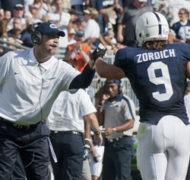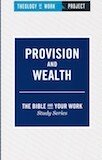Choosing an Executive Coach
Blog / Produced by The High Calling
At some point in every leader's vocational journey, he or she slams into the limits of their strengths and/or the destructive power of their weaknesses. It's at these times that an executive coach can offer guidance for getting back on course. The High Calling asked two seasoned executives when a leader might need this kind of help and how to find it.
Executive Coaching: What It Is and What It Isn't
First, let’s define what an executive coach is and what one isn’t.
An executive coach generally helps a professional person address a specific career issue, typically an area of weakness, said Diane Paddison, chief strategy officer for Cassidy Turley Commercial Real Estate Services, author of Work, Love, Pray: Practical Wisdom for Young Professional Christian Women and Those Who Want to Understand Them, and founder of 4wordwomen.org, a website designed to help professional women “achieve their God-given potential." For example, Paddison recommended coaching for an employee who was unaware that he spoke condescendingly to his coworkers. The coach devised an in-depth plan to help the employee improve in this area and Paddison tied his end-of-year bonus to the progress he made over the course of a year.
Executive coaching differs from mentoring in that a mentor is typically a person who works alongside the mentee and offers career guidance, but is not the mentee’s supervisor. Instead, a mentor may help an employee navigate their relationship with a boss. Part of being a mentor is recommending in-depth help when a mentee needs it. That help often comes in the form of an executive coach, said Paddison.
"I have a great mentor but a coach can be more available and more involved because it is part of their financial compensation. From my observances, even the most well-meaning person who does something on a volunteer basis won't put as much into it as a person whose livelihood is based on it," said Mark Russell, founder and CEO of Russell Media and author of several books, including Our Souls at Work: How Great Leaders Live Their Faith in the Global Marketplace, a resource that Russell contributed to, edited, and published.
Executive coaching differs from career coaching in that the latter is more general in nature, said Paddison. It differs from consulting in that a consultant is generally someone with specific expertise who is hired to solve a work-place problem. “Typically, [a consultant] is not going to get into the personal details that a coach would,” she said. And, it differs from sponsorship in that a sponsor is “someone who will put themselves on the line for you,” Paddison said. A sponsor generally works for the same organization and advances you when opportunities arise. Numerous studies show that what separates leaders (especially women) who experience career progression from those who don’t is having a sponsor, she added.
Guidelines for Choosing an Executive Coach
Paddison recommends four guidelines for choosing an executive coach:
1. Good chemistry: Without chemistry, the coach’s advice won’t be trusted. “You can have someone who is a great coach who has great results with someone who will not have great results with someone else because your personalities just don’t mesh,” said Paddison.
2. Experience: “You’ve got to hire someone who has had extensive experience in the exact same profession,” Paddison said. And, the person should be an experienced coach with professional certification.
3. Tough Talk: The coach should be willing to discuss your weaknesses as well as your strengths. “We should at least be aware of our weaknesses so that we know how to complement those weaknesses with people who have those as strengths,” said Paddison.
4. Insider Perspective: A coach who understands the culture and inner workings of your organization is not required, but is “really special if you can get it.” She said, “There are obviously always dynamics within organizations that are unique and if the coach understands that already, they don’t have to get up the learning curve … and that’s a real plus.”
"What determines qualification in my mind is their character and commitment to your personal growth. Ideally, you should know the coach and have observed her or him in a variety of settings. If not, then recommendations from people that have are a good second option. Remember it's easy to appear sharp and smart from a distance. A good coach may not be the slickest person but can be quiet, a person of few words but with profound insight into life," said Russell. Paddison recommends meeting with at least three potential coaches before choosing one.
Expectations should be clearly spelled out in the coaching agreement and can vary widely, Russell said. "Lots of people expect more than they receive and this is often the result of problematic expectations."
Executive coaching can be open-ended or finite and fees vary widely. "Some coaching relationships are crisis or transition related and are, therefore, short-term. Others are long-term," said Russell. "I wouldn't limit the price range other to say what is it worth to you and will it produce a sound return on investment for you? I wouldn't recommend debt or over-extending to get a coach. But the return on investment is not just financial but also personal (emotional, mental, spiritual)."
Once you’ve hired an executive coach, a major red flag would be a lack of focus on the issues you’ve hired the person to address. The coach should help you formulate an action plan, create milestones, and provide feedback. “If they’re just basically meeting with you to chat, that’s definitely not a coach and it’s definitely not a good use of your money,” said Paddison.
Image by PennStateLive. Used with permission. Sourced via Flickr. Post by Christine A. Scheller.





